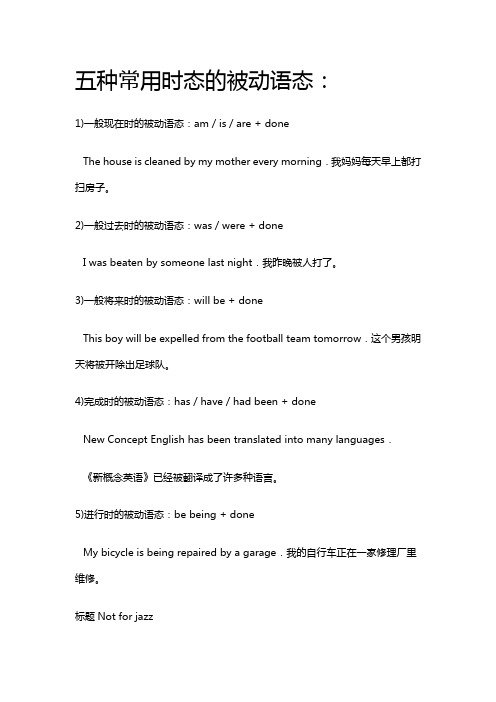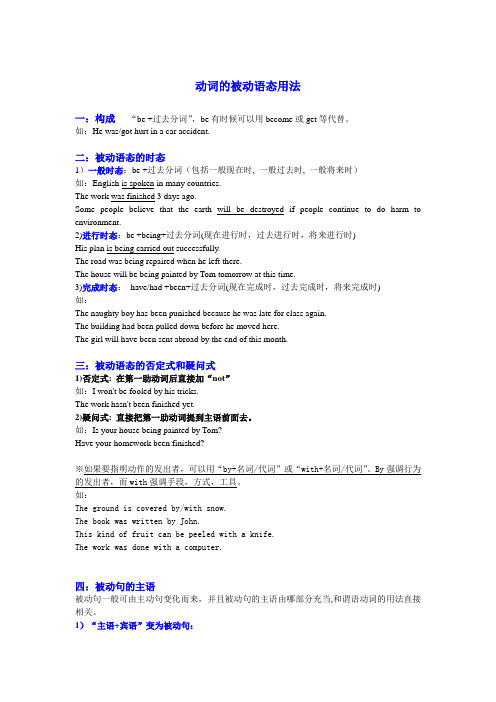finished可用于被动语态
- 格式:ppt
- 大小:101.50 KB
- 文档页数:13

五种常用时态的被动语态:1)一般现在时的被动语态:am/is/are + doneThe house is cleaned by my mother every morning.我妈妈每天早上都打扫房子。
2)一般过去时的被动语态:was/were + doneI was beaten by someone last night.我昨晚被人打了。
3)一般将来时的被动语态:will be + doneThis boy will be expelled from the football team tomorrow.这个男孩明天将被开除出足球队。
4)完成时的被动语态:has/have/had been + doneNew Concept English has been translated into many languages.《新概念英语》已经被翻译成了许多种语言。
5)进行时的被动语态:be being + doneMy bicycle is being repaired by a garage.我的自行车正在一家修理厂里维修。
标题Not for jazz总结for的用法:1)为:I bought a book for you.我为你买了一本书。
2)因为:Something fell in,for I heard a splash.一定有东西掉下去了,因为我听见扑通一声。
4)适合:Not for jazz=It's not suitable to play jazz on the clavichord.古钢琴不适合演奏爵士乐。
Question:What happened to the clavichord?to后面加宾语,表示其身上发生了什么事,即动作的目标、对象。
What happened to you?你怎么了?(在你身上发生了什么事?)(1)否定句与疑问句的被动语态We don’t believe her.我们不信她的话。

高中英语知识点归纳动词的完成被动语态动词的完成被动语态是英语语法中的一个重要知识点。
在学习和运用英语时,正确理解和运用动词的完成被动语态可以帮助我们更准确地表达动作的完成和受事者的被动经历。
本文将对高中英语知识点中的动词的完成被动语态进行归纳和分析,并给出一些常见的使用例句。
一、动词的完成被动语态的构成动词的完成被动语态由助动词“have been”或“has been”和动词的过去分词构成。
其中,“have been”用于第一人称(I、we)和第二人称(you)复数,以及第三人称(he、she、it)复数;“has been”用于第三人称单数。
例如:- 主动语态:They have cleaned the room.- 完成被动语态:The room has been cleaned by them.二、动词的完成被动语态的用法1. 表示动作的完成和受事者的被动经历。
例如:- 主动语态:I have written the report.- 完成被动语态:The report has been written by me.2. 在没有表示动作执行者的情况下,强调受事者或客观情况。
例如:- 主动语态:Someone has stolen my phone.- 完成被动语态:My phone has been stolen.3. 在需要使用被动语态的句型中。
例如:- 主动语态:They have received the invitation.- 完成被动语态:The invitation has been received by them.三、动词的完成被动语态常见的时态和语态转换1. 一般现在时- 主动语态:We have cleaned the house.- 完成被动语态:The house has been cleaned by us.2. 一般过去时- 主动语态:He had finished his homework.- 完成被动语态:His homework had been finished by him.3. 一般将来时- 主动语态:They will have completed the project.- 完成被动语态:The project will have been completed by them.4. 现在进行时- 主动语态:She has been painting the wall.- 完成被动语态:The wall has been being painted by her.5. 过去进行时- 主动语态:They had been repairing the car.- 完成被动语态:The car had been being repaired by them.6. 现在完成时- 主动语态:We have planted the trees.- 完成被动语态:The trees have been planted by us.7. 过去完成时- 主动语态:He had written the letter.- 完成被动语态:The letter had been written by him.四、注意事项1. 动词的完成被动语态要根据不同的主语的数量和人称变化。

动词的被动语态用法一:构成“be +过去分词”,be有时候可以用become或get等代替。
如:He was/got hurt in a car accident.二:被动语态的时态1)一般时态:be +过去分词(包括一般现在时, 一般过去时, 一般将来时)如:English is spoken in many countries.The work was finished 3 days ago.Some people believe that the earth will be destroyed if people continue to do harm to environment.2)进行时态:be +being+过去分词(现在进行时,过去进行时,将来进行时)His plan is being carried out successfully.The road was being repaired when he left there.The house will be being painted by Tom tomorrow at this time.3)完成时态:have/had +been+过去分词(现在完成时,过去完成时,将来完成时)如:The naughty boy has been punished because he was late for class again.The building had been pulled down before he moved here.The girl will have been sent abroad by the end of this month.三:被动语态的否定式和疑问式1)否定式: 在第一助动词后直接加“not”如:I won't be fooled by his tricks.The work hasn't been finished yet.2)疑问式: 直接把第一助动词提到主语前面去。

英语中有两种语态,主动语态和被动语态。
1.主动语态:表示谓语动词的动作是由主语发出的。
这时主语是动作的执行者。
例如:I have finished this work.我完成了这件工作。
(“have finished”这个动作是由“I”发出的,因此“I”就是动作的执行者。
)He went out when I got there.当我到那儿时,他出去了。
2.被动语态:当句子的主语是谓语动词的动作的承受者时,或者主语是动作的对象。
因此,只有及物动词才有被动语态。
例如:He was punished by his father.他受到他父亲的惩罚。
(句中的“He”就是谓语动词“punished”的承受者。
)在被动语态的句子中,如果想强调动作的执行者时,用介词by加动作的执行者来表示。
例如:On the way home, he was beaten by Tom.在回家的路上,他被汤姆打了。
The glass on the desk was broken by me.桌子上的玻璃杯是我打碎的。
常用的十种被动语态被动语态的构成:助动词be +动词的过去分词。
英语中最常用的被动语态有十种:1.一般现在时:由am / are / is +done构成。
例如:I am often praised by the teachers.我经常受到老师们的表扬。
He is a good teacher. He is respected by the teachers and his students.他是位好老师,受到师生们的好评。
You are wanted on the phone.有你的电话。
2.一般过去时:由was / were+done构成。
例如:I was asked to go to Harbin on business yesterday.我昨天被派往哈尔滨出差了。
This teaching building was completed the day before yesterday.这栋教学大楼是前天竣工的。

finish的用法总结Finish的用法总结一、Finish的基本意思和用法Finish是一个常见的动词,基本意思是“完成”、“结束”或“完成某个动作”。
其基本用法包括:1. 表示完成某项任务或工作:例如,“I finished my homework”(我完成了作业)。
2. 表示结束某个活动或事件:例如,“The meeting finished at 6 pm”(会议在下午6点结束)。
3. 表示用完某物或吃完食物:例如,“He finished his plate of food”(他吃完了盘子里的食物)。
4. 表示达到某种状态或程度:例如,“She finished her studies and became a doctor”(她完成学业并成为了一名医生)。
二、Finish的时态和语态变化1. Finish的过去式是“finished”,过去分词是“finished”。
2. Finish是一个及物动词,可以用主动语态或被动语态。
例如,“She finished the job”(她完成了这项工作)和“The job was finishe d by her”(这项工作被她完成了)。
三、Finish和其他动词的搭配1. Finish off:表示“完成最后的部分”或“结束某人的事情”。
例如,“I'll finish off the painting tomorrow”(明天我会完成这幅画)和“He finished off his opponent with apowerful punch”(他用一记有力的拳头结束了对手)。
2. Finish up:表示“完成全部事物”或“结束某事”。
例如,“Let's finish up the project before the deadline”(在截止日期前我们完成这个项目吧)和“After dinner, she finished up the remaining work”(晚饭后,她完成了剩下的工作)。

finish的过去式和用法例句finish有完成;结束;最后加工;用完等意思,那么你知道finish的过去式是什么吗?下面跟着小编一起来学习一下,希望对大家的学习有所帮助!finish的各种时态:过去式: finished过去分词: finished现在分词: finishingfinish的用法:finish的用法1:finish的基本意思是结束,完成,表明已达到所做事情的终点。
引申可表示用光,吃光毕业杀掉等。
finish的用法2:finish可用作及物动词,也可用作不及物动词。
用作及物动词时可接名词、代词或动名词作宾语,不能接动词不定式。
finish的用法3:finish用作不及物动词时,其主动形式往往表示被动意义,常译为完了,停止,结束。
finish的用法4:finish有时可用作系动词,后接名词当表语,表示结果变成,此时finish意同become。
finish的用法5:finish后接off表示做完或杀死; 后接up表示吃光或做完; 后接with时表示用完或断绝与的关系。
finish的用法6:finish的过去分词finished和现在分词finishing均可用作形容词,在句中作定语。
过去分词表示完成意义,现在分词表示进行意义。
finish的用法7:be finished 有时是被动语态,有时是系表结构(尤用于人称结构)。
finish的过去式例句:1. He finished his conversation and stood up, looking straight at me.他说完话站起来,直视着我。
2. It was just gone 7 oclock this evening when I finished.今晚我做完的时候刚过7点。
3. They had met by chance at university and finished up getting married.他们在大学偶遇,最后结了婚。
didn't 的被动语句
被动语态的形式为wasn't/weren't +过去分词。
这个同样适用于didn't的被动语句形式,即:wasn't/weren't +
过去分词。
其中,wasn't用于单数主语,而weren't则用于复数主语。
举例:
1.主动语态:She didn't finish her homework.
被动语态:Her homework wasn't finished by her. (单数主语;动词使用过去分词形式finished)
2.主动语态:They didn't invite me to the party.
被动语态:I wasn't invited to the party by them. (复数主语;动词使用过去分词形式invited)
拓展:
被动语态通常用于强调动作的接受者或结果,或者主语对动作的
被动态度。
它的使用可以使语句更加客观,减少重复性的表达。
在一般疑问句中,被动语态的形式为wasn't/weren't +主语+过去分词。
例如:
1.主动语态:Didn't she answer the phone?
被动语态:Wasn't the phone answered by her?
2.主动语态:Didn't they repair the car?
被动语态:Wasn't the car repaired by them?
需要注意的是,有些动词在被动语态中可能会发生变化,例如be 动词本身并不需要转换。
各种时态的被动语态举例(以动词do为例)1.一般现在时(am/ is/ are +done)English is spoken by lots of people in the world. 世界上的许多人都说英语。
Class meeting is held every Thursday. 每周四都举行班会。
The classroom is cleaned by the students every day. 学生们每天都打扫教室。
2.一般过去时(was/ were +done)The cup was broken by the boy. 杯子被那个男孩打碎了。
He was saved at last. 他最终获救了。
My bike was stolen. 我的自行车被偷了。
3.一般将来时与过去将来时(will/ shall be +done; would/should be +done)A speech will be given this afternoon. 今天下午有一个演讲。
A new road will be built next year. 明年要修一条新马路。
I thought thousands of people would be helped. 我认为将有数千人得到帮助。
4.现在进行时与过去进行时(am/ is/ are being +done; was/ were being +done) The machine was being repaired at this time yesterday. 昨天这时,机器正在被修理。
The problem is being discussed now. 问题正在被讨论。
A bus is being pushed by the passengers. 路人正在推一辆公共汽车。
5.现在完成时(have/ has been + done)Two hundred trees have been planted by now. 到现在为止,已经种了二百棵树了。
被动语态在不同时态中的变化在英语学习中,被动语态是一个重要的语法点。
它用于强调动作的承受者,或者在不知道动作执行者、无需指出动作执行者时使用。
而被动语态在不同的时态中有着不同的变化形式,理解这些变化对于我们准确、流利地运用英语至关重要。
一般现在时的被动语态构成是“am/is/are +过去分词”。
比如,“The book is read by many people”(这本书被很多人读。
)这里“is read”就是一般现在时的被动语态,“read”是“read”的过去分词形式。
在这个句子中,动作“read”的承受者“the book”被置于主语的位置,强调了书被读的这个状态。
一般过去时的被动语态是“was/were +过去分词”。
例如,“The tree was cut down yesterday”(这棵树昨天被砍倒了。
)“was cut down”清晰地表明了过去某个时间点树被砍倒的动作。
一般将来时的被动语态为“will be +过去分词”或者“be going to be +过去分词”。
像“The meeting will be held next week”(会议将在下周举行。
)和“A new building is going to be built here”(这里将要建一座新大楼。
)这两个句子,分别展示了两种一般将来时被动语态的构成形式,让我们能准确地表达未来将要发生的被动动作。
现在进行时的被动语态结构是“am/is/are + being +过去分词”。
“The problem is being discussed now”(这个问题正在被讨论。
)通过“is being d iscussed”,我们强调了此刻问题处于被讨论的进行状态。
过去进行时的被动语态则是“was/were + being +过去分词”。
比如,“The house was being painted when I came back”(我回来的时候房子正在被粉刷。
动词被动语态知识点(大全)一、动词被动语态1.— I wonder if we ________ four days off by the end of this month.— I hope so. But if our task ________ finished, we'll have to work overtime.A. will have;won'tB. have;won'tC. will have;isn'tD. have;doesn't【答案】C【解析】【分析】句意:—我想知道我们在这个月底是否将会有四天的假期。
—我希望如此,但是如果我们的任务没有完成,我们就将会加班。
will have将会有;have有,一般现在时;won't是will not的缩写形式,表示将来;isn't是is not的缩写,是一般现在时;doesn't是does not的缩写,是一般现在时的第三人称单数形式。
第一个空前if的意思是是否,引导宾语从句,从句中表示将来的事情,故用一般将来时态;第二个空前的if是如果,引导条件状语从句,从句中用一般现在时态代替一般将来时态,主句用一般将来时态,从句中的主语our task和动词finish构成被动语态,故应用be+过去分词形式,选C。
【点评】本题是对时态,语态的综合考查。
难点在于两个if ,第一个是引导宾语从句,表示将来的动作用将来时态。
但第二个是引导状语从句,用一般现在代替一般将来。
注意对这些知识点的熟练掌握。
2.Last year, five Chinese teachers to a school in the UK to teach the British students in Chinese style for four weeks.A. was sentB. were sentC. have sentD. sent【答案】B【解析】【分析】句意:去年,五名语文老师被派往英国的一所学校达四周的时间用中国式的方法教英国的学生。